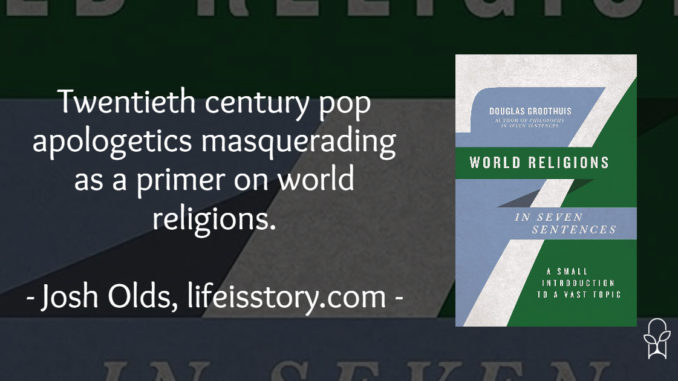
Series: Introductions in Seven Sentences #5
Published by IVP Academic on September 5, 2023
Genres: Academic, Non-Fiction, Apologetics, Theology
Buy on Amazon
Goodreads

Understanding the beliefs and practices of other faiths is essential not just to the task of interreligious dialogue, but also to grasping one's own faith.
In this brief volume in IVP Academic's Introductions in Seven Sentences, philosopher Douglas Groothuis creatively uses a single sentence representing each of several world religions as a way to open readers to their depth and complexity, including:
Atheism: "God Is Dead."
Judaism: "I Am Who I Am."
Hinduism: "You Are That."
Buddhism: "Life Is Suffering."
Daoism: "The Dao That Can Be Spoken Is Not the Eternal Dao."
Christianity: "Before Abraham Was, I Am."
Islam: "There Is One God, and Mohammad Is His Prophet."
With a sympathetic but not uncritical approach, Groothuis welcomes readers to a vital and global conversation.The accessible primers in the Introductions in Seven Sentences collection act as brief introductions to an academic field, with simple organization: seven key sentences that give readers a birds-eye view of an entire discipline.
If you were asked to summarize your religion in one sentence, how would you do it? That’s the underlying premise of World Religions in Seven Sentences by Douglas Groothius. Using single-sentence premises, Groothius offers readers short twenty-page overviews of the most prominent world religions: atheism, Judaism, Hinduism, Buddhism, Daoism, Christianity, and Islam. While the book doesn’t make this clear initially, World Religions in Seven Sentences is not a straightforward introductory overview of these religions, but rather a comparative apologetic between these religions and Christianity.
Author Douglas Groothius is best known as a Christian apologist (see his magnum opus Christian Apologetics) and his perspective here in World Religions in Seven Sentences is to delineate what he perceives to be the inconsistencies and flaws in six of the world religions while championing his own. I only point this out because the distinction is important. This is not an unbiased examination of world religion; it is a Christian apologetic. Those looking for more objective perspectives, perhaps written by experts in those religions will have to look elsewhere. From the outset, I think IVP and Groothius would have done better to more clearly advertise the apologetic nature of the book.
Frankly, I’m wasn’t a fan of the book even from an apologetic perspective. The first chapter on atheism focuses on Friedrich Nietzsche’s statement “God is dead.” Already, we have a problem: atheism is much larger philosophically than Nietzschean nihilism. But Thus Spake Zarathustra is compelling and attacking Nietzsche is tried, true, and popular. (Which also means there are well-developed counterarguments to Groothius’s claims.) For example, Groothius contends that atheism is “a necessary condition” for “massive injustice on a revolutionary scale.” That’s a bold claim that historical and current events like the Crusades, the Inquisition, Islamic jihad, India/Pakistan relations, US slavery, and other religiously-backed massive injustices seem to easily counteract. Groothius simply states claims without backing and never goes into why individuals might be drawn toward atheism.
I could write a paragraph like this for every chapter. In the chapter on Hinduism, he includes a footnote as to why he believes Christians should not participate in the exercise of yoga. In the chapter on Islam, he focuses on what he perceives as Islam’s violence, in one case writing that every chapter of the Quran talks about eternal damnation (never mind the oft-repeated evangelical line that “Jesus talked more about hell than any other subject.”) It’s twentieth-century pop apologetics masquerading as a primer on world religions.
Suffice it to say I was incredibly disappointed with this book and its tone. I would’ve been fine if this book had been marketing as apologetics and actually contained substantive apologetics. Groothius writes at the beginning of World Religions in Seven Sentences that we live in a pluralistic society and interreligious dialogue is necessary. That’s true. This book doesn’t further that goal.
